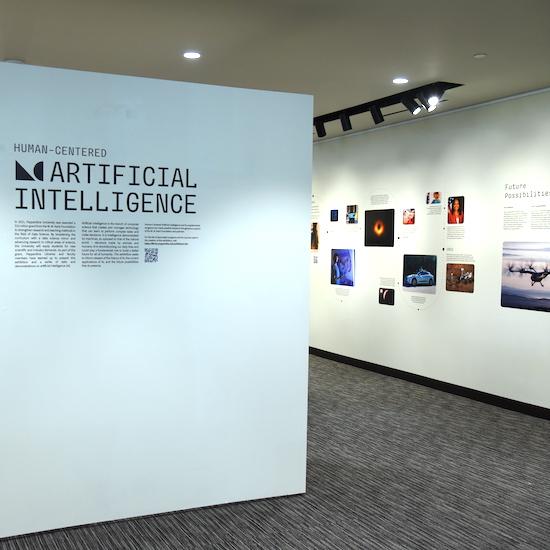Pepperdine Libraries Hosts Human-Centered Artificial Intelligence Exhibit

The Pepperdine community came together on Thursday, November 3, 2022, for a closing reception for the Human-Centered Artificial Intelligence exhibit held at the Payson Library Exhibit Gallery. The exhibit was the brainchild of Fabien Scalzo, associate professor of computer science at Seaver College, who served as co-curator of the exhibit with Jeffrey Bowen, director of library programming and public affairs for Pepperdine Libraries.
Scalzo approached Pepperdine Libraries about hosting an AI exhibition as part of the University's second annual Human-Centered AI Conference that was held this fall. Like all sciences, the understanding of artificial intelligence is always evolving, and the curators decided to incorporate that idea into their presentation. While the exhibition went through a few iterations, the co-curators settled on a timeline across the back and side walls of the exhibition space.
The exhibit served as an introduction to library visitors to artificial intelligence—what it is and how it works. Scalzo also wanted to show that AI is already a part of our everyday lives. "I wanted students and faculty at Pepperdine to know that AI is already contributing a lot to many different verticals of our society, from arts to medicine and filmmaking," he says. "I wanted to provide a timeline to give an overview of where it comes from, what it is doing today, and what it could do in the future."
The exhibit, as was the conference from which it sprung, focused on the "human-centered" aspect of artificial intelligence. Scalzo notes that research in the field of artificial intelligence is much more valuable when it can be of substantive benefit to people. "It's a different approach, in that we emphasize the technology's ability to help and contribute to the betterment of the society," he says. "We can shape what the computers should do based on what we need." Scalzo also observes that human-centered AI is always considering the ethical impact of a particular data project. "It emphasizes the ethics of what's being developed, not just caring about the technology, but also caring about respecting fairness, and respecting privacy and equality."
The exhibition was funded by the W. M. Keck Foundation's 2021 $10 million grant to Pepperdine to further research and teaching in the field of data science and artificial intelligence. Scalzo is now leading this effort at Pepperdine as the director of the University's new Keck Institute for Data Science, which is housing the new data science minor including four new courses, providing faculty with the tools to conduct research in the field, and upgrading classrooms and equipment for computing and imaging. "We are really well equipped now for training students and having them undertake research with faculty," says Scalzo. The development of a data science major is one of the future endeavors of the institute.
The grant from the Keck Foundation has already gone far in supporting the University's human-centered artificial intelligence work, and Scalzo is looking forward to the institute's future. "We want the institute to become a regional center in furthering the human-centered approach," he says, "where we really place Christian values at the center of what we learn about and what we do."